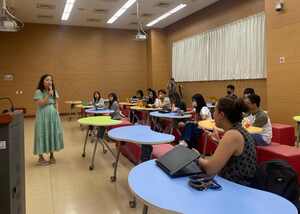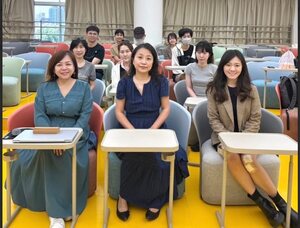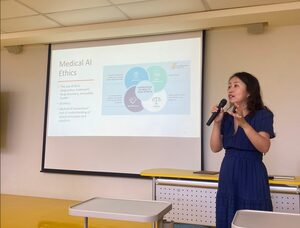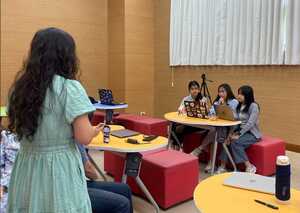AI Meets Health Ethics: Texas A&M Professor Shares Insights at GCIT




【Article by GCIT】
The Master’s Program in Global Communication and Innovation Technology (GCIT) at National Chengchi University (NCCU) welcomed Professor Lu Tang from Texas A&M University for a two-day event focused on artificial intelligence (AI). Coordinated by Professors Trisha Lin and Christine Cook, the visit featured a hands-on chatbot-building workshop on May 12 and a public lecture on May 14 exploring AI’s ethical role in healthcare.
The sessions provided an in-depth examination of AI’s innovative applications in social justice and health communication, as well as the accompanying ethical challenges.
Planned and chaired by Distinguished Professor Trisha Lin, Director of GCIT, the event included a hands-on chatbot workshop and a public lecture on AI in health communication. Professor Lu Tang, who heads the Data Justice Lab at Texas A&M University, specializes in leveraging AI to address health and communication inequalities.
During the workshop on May 12, Professor Tang guided participants, most of whom were new to programming, in building chatbot prototypes using Python, Gradio, and OpenAI language models. Despite being beginners, they successfully developed practical prototypes for dietary tracking and study planning. “Before ChatGPT, we relied on collaborative platforms like Stack Overflow to share knowledge and solve problems together.” Professor Tang noted, “This emphasized the enduring importance of collaborative learning in the AI era.”
The workshop also examined the inner workings of AI systems and the ethical considerations surrounding the design of chatbot emotional expressiveness. Professor Tang warned that overly empathetic responses can create an “uncanny valley” effect in human-AI interactions, requiring careful balance in system design.
Ethical Challenges in Health Communication
The public lecture on May 14 focused on AI’s applications in health communication and medical decision-making. Professor Tang warned that biases in AI training data can exacerbate health disparities based on race, gender, or socioeconomic status. She shared practical insights from the COVID-19 pandemic, when chatbots were used to correct misinformation about the HPV vaccine and provide accurate health information to marginalized groups. However, she also warned of AI’s commercial risks: “Many media platforms operate as advertising-driven models, where developers prioritize user engagement and data collection over user well-being.”
When asked whether AI could replace the human touch in psychological counseling, Professor Tang replied, “AI can mimic empathy, but it can’t genuinely experience emotions. Combined with issues like ‘memory gaps’ and ‘always agreeing with the user,’ AI poses inherent risks in mental health applications.”
Students engaged in discussions on the potential of multimodal AI systems that integrate voice and facial expression recognition in psychological interventions, and the role of AI in shaping public perceptions of vaccine uptake and climate change. Professor Tang remarked, “Even when people distrust AI, they often can’t refute its logical arguments, which is precisely why AI has such power to influence attitudes.”
In conclusion, Professor Tang emphasized that the design of AI systems must prioritize data justice. In high-stakes areas like palliative care, AI should remain an assistive tool rather than a decision-maker. “AI can calculate probabilities, but it cannot grasp the meaning and dignity of human life,” she stressed. “AI is never neutral; it reflects the data we choose to feed it, the voices we amplify, and ultimately, the future we are building together.”
GCIT continues to promote interdisciplinary and cross-cultural exchanges by inviting international scholars and fostering dialogue with international students in Taiwan, thereby nurturing globally minded professionals in communication and technology.
[此中英文稿和圖片以及全球傳播與創新科技碩士學位學程均獲得中華民國文化部的補助。]


 Fax:886-2-29379611
Fax:886-2-29379611